A Study on Employee Productivity and Motivation at Travelodge Hotels
VerifiedAdded on 2023/02/01
|13
|1006
|29
Report
AI Summary
This research report investigates the impact of employee productivity and motivation on consumer services within Travelodge Hotels. The study aims to understand employee motivation, examine consumer satisfaction techniques, and determine the effects of employee productivity on consumer services. The report includes a literature review, exploring concepts of employee motivation and productivity, and methods used by Travelodge for customer satisfaction. The research methodology utilizes an interpretivism philosophy and both primary and secondary data collection methods, with qualitative data analysis. Findings highlight the importance of financial and non-financial incentives for employee productivity. The report recommends delegating authority, assigning responsibilities to qualified employees, and improving communication to enhance productivity. The conclusion emphasizes the value of employee productivity for organizational growth and the suitability of the interpretivism philosophy for this research. The report also includes a detailed references section.

Research Project
Paraphrase This Document
Need a fresh take? Get an instant paraphrase of this document with our AI Paraphraser
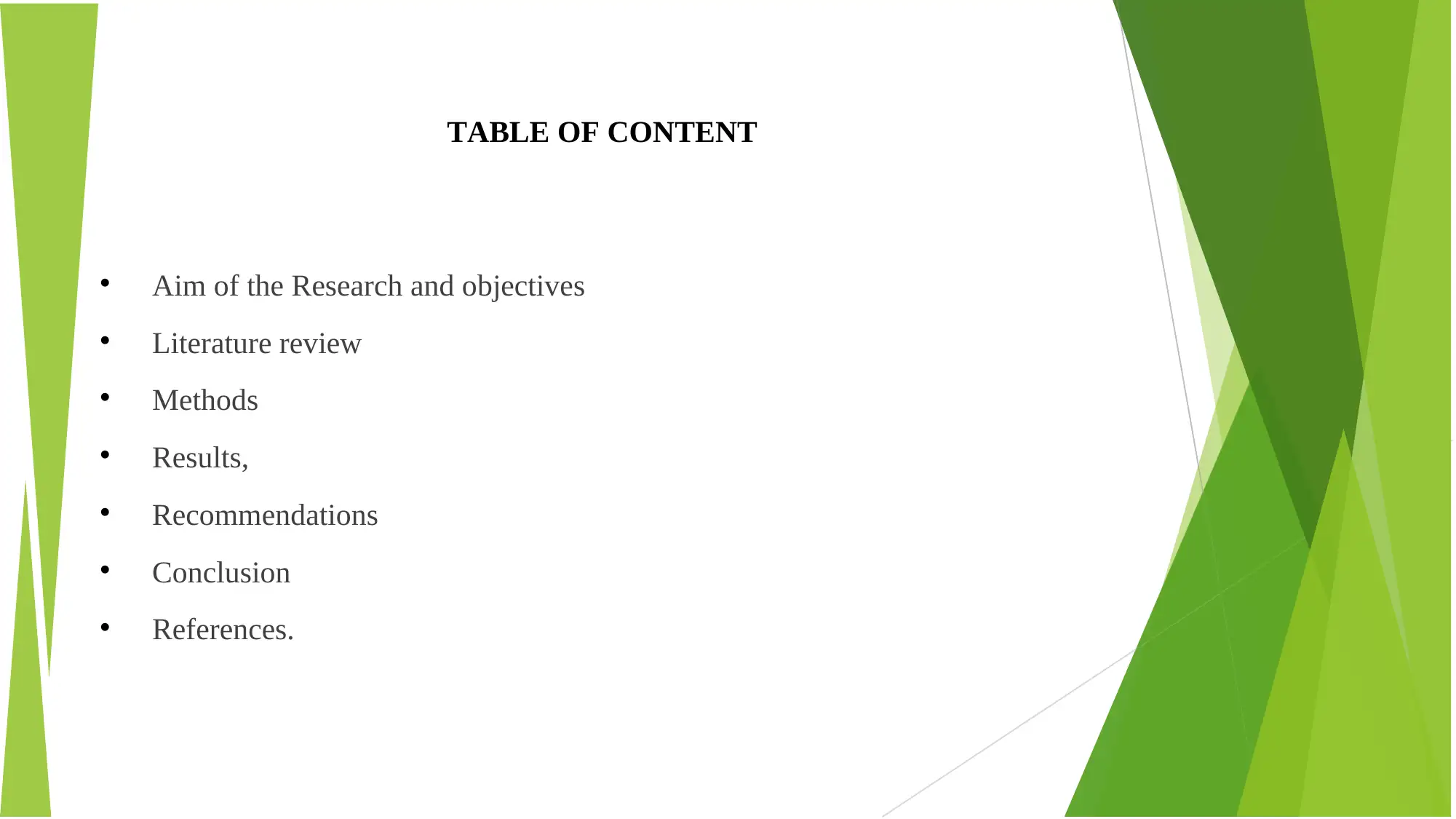
TABLE OF CONTENT
Aim of the Research and objectives
Literature review
Methods
Results,
Recommendations
Conclusion
References.
Aim of the Research and objectives
Literature review
Methods
Results,
Recommendations
Conclusion
References.
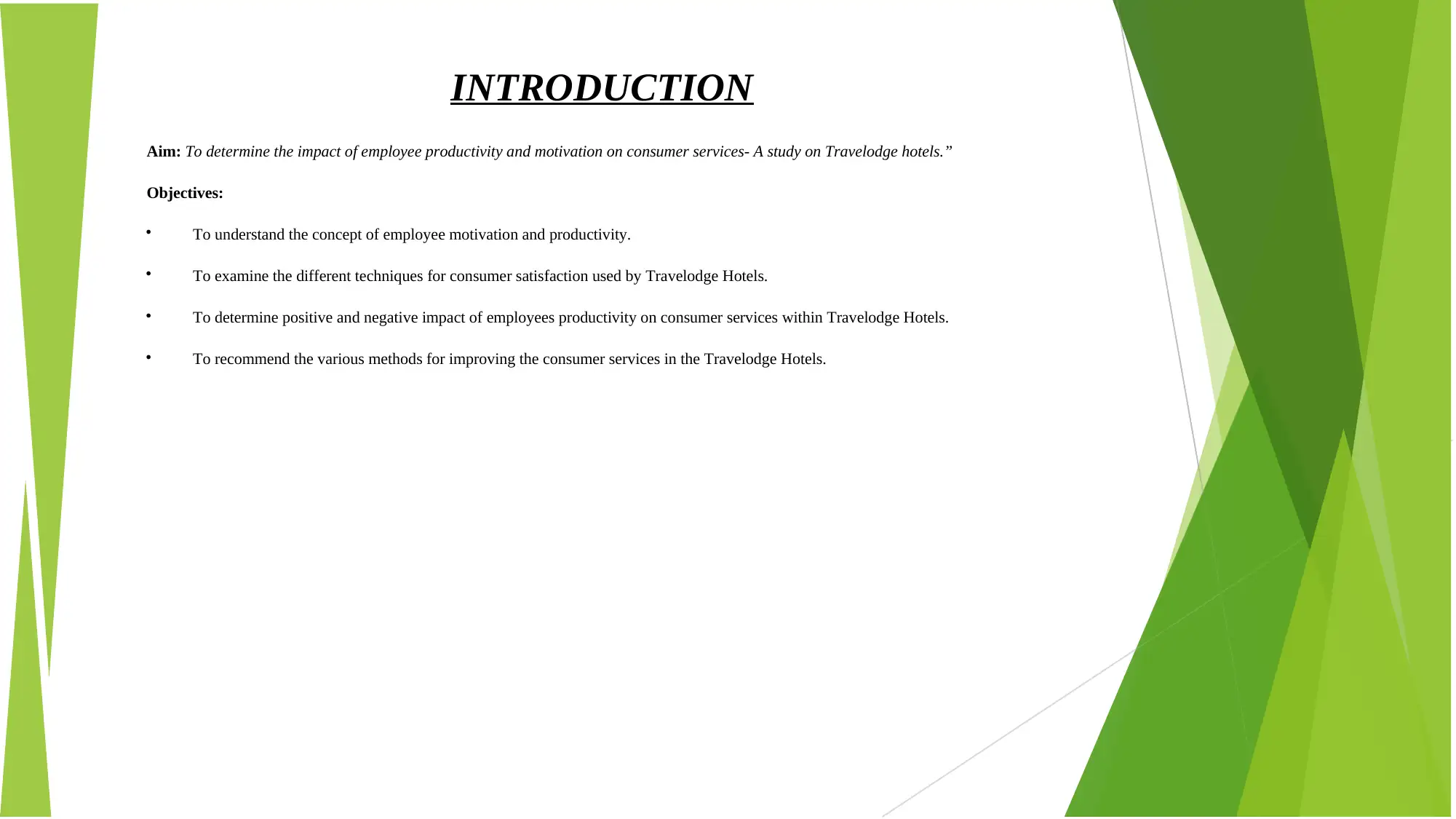
INTRODUCTION
Aim: To determine the impact of employee productivity and motivation on consumer services- A study on Travelodge hotels.”
Objectives:
To understand the concept of employee motivation and productivity.
To examine the different techniques for consumer satisfaction used by Travelodge Hotels.
To determine positive and negative impact of employees productivity on consumer services within Travelodge Hotels.
To recommend the various methods for improving the consumer services in the Travelodge Hotels.
Aim: To determine the impact of employee productivity and motivation on consumer services- A study on Travelodge hotels.”
Objectives:
To understand the concept of employee motivation and productivity.
To examine the different techniques for consumer satisfaction used by Travelodge Hotels.
To determine positive and negative impact of employees productivity on consumer services within Travelodge Hotels.
To recommend the various methods for improving the consumer services in the Travelodge Hotels.
⊘ This is a preview!⊘
Do you want full access?
Subscribe today to unlock all pages.

Trusted by 1+ million students worldwide
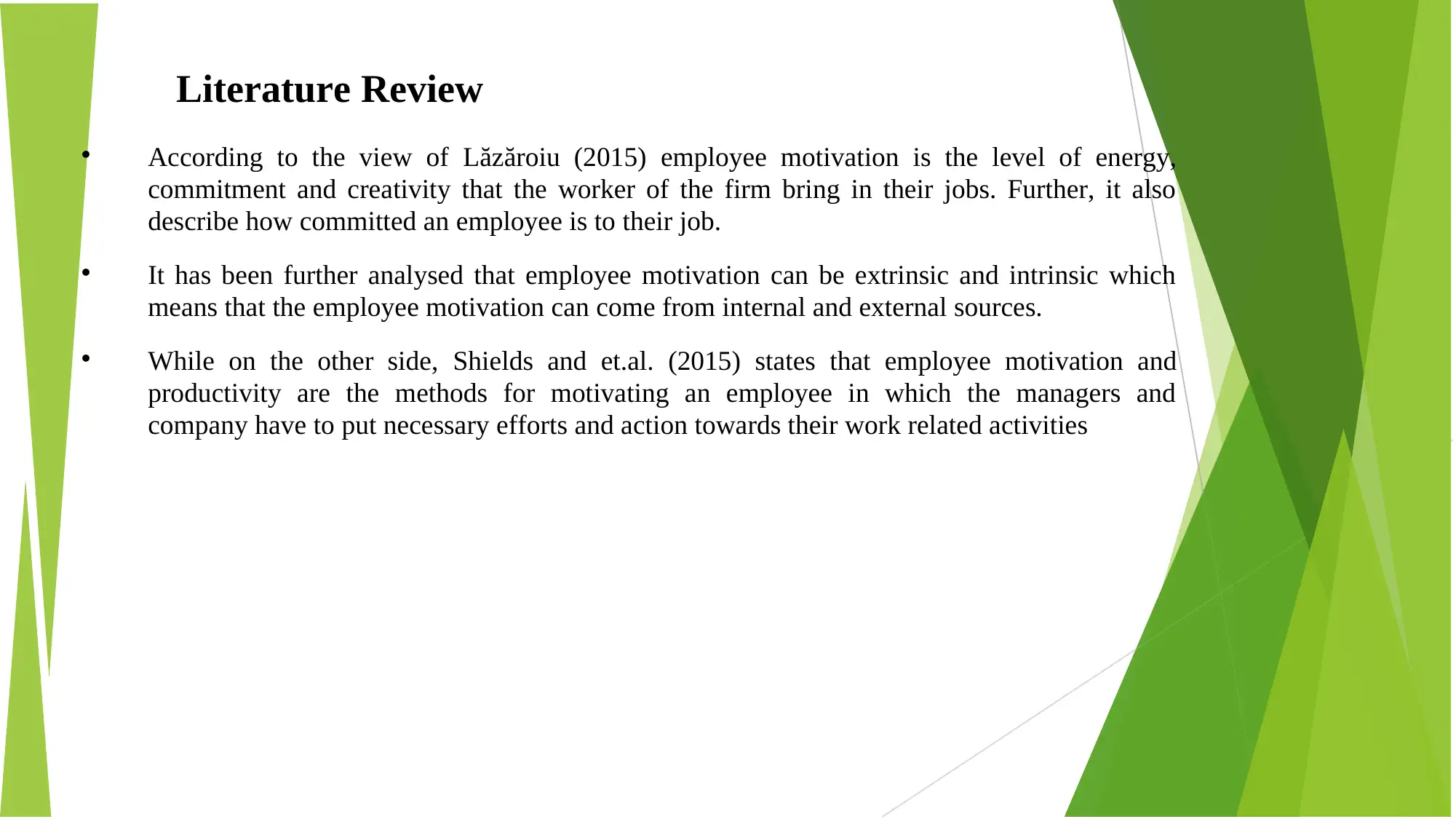
Literature Review
According to the view of Lăzăroiu (2015) employee motivation is the level of energy,
commitment and creativity that the worker of the firm bring in their jobs. Further, it also
describe how committed an employee is to their job.
It has been further analysed that employee motivation can be extrinsic and intrinsic which
means that the employee motivation can come from internal and external sources.
While on the other side, Shields and et.al. (2015) states that employee motivation and
productivity are the methods for motivating an employee in which the managers and
company have to put necessary efforts and action towards their work related activities
According to the view of Lăzăroiu (2015) employee motivation is the level of energy,
commitment and creativity that the worker of the firm bring in their jobs. Further, it also
describe how committed an employee is to their job.
It has been further analysed that employee motivation can be extrinsic and intrinsic which
means that the employee motivation can come from internal and external sources.
While on the other side, Shields and et.al. (2015) states that employee motivation and
productivity are the methods for motivating an employee in which the managers and
company have to put necessary efforts and action towards their work related activities
Paraphrase This Document
Need a fresh take? Get an instant paraphrase of this document with our AI Paraphraser

Continued....
Managing the customer satisfaction is considered one of the biggest challenge for Travelodge
and as per the view of Buchanan and McCalman (2018), direct methods is one the technique
that can be used by the firm, in which a company can make direct contact to their customers.
They also get their feedback through third party agencies, compliant or appreciation letter, by
surveys and questionnaires etc.
Further, Travelodge mostly employ the external agencies in order to listen to their customers
and also provide them valuable feedback.
Apart from this, the company's representative can also do market visit.
Through this, they get the information regarding different segments of the products and
services which are provided to the customers.
Managing the customer satisfaction is considered one of the biggest challenge for Travelodge
and as per the view of Buchanan and McCalman (2018), direct methods is one the technique
that can be used by the firm, in which a company can make direct contact to their customers.
They also get their feedback through third party agencies, compliant or appreciation letter, by
surveys and questionnaires etc.
Further, Travelodge mostly employ the external agencies in order to listen to their customers
and also provide them valuable feedback.
Apart from this, the company's representative can also do market visit.
Through this, they get the information regarding different segments of the products and
services which are provided to the customers.

Research Methods
Research methodology is the process that is used to collect the information and data in
order to make the better decision for the company. This includes the following:
Research Philosophy:
It is the belief in which the data is gathered, analysed and used.
From the above, the researcher chooses interpretivism research philosophy
because it helps to attain the aim and objective of the study that is To determine
the impact of employee productivity and motivation on consumer services.
Research methodology is the process that is used to collect the information and data in
order to make the better decision for the company. This includes the following:
Research Philosophy:
It is the belief in which the data is gathered, analysed and used.
From the above, the researcher chooses interpretivism research philosophy
because it helps to attain the aim and objective of the study that is To determine
the impact of employee productivity and motivation on consumer services.
⊘ This is a preview!⊘
Do you want full access?
Subscribe today to unlock all pages.

Trusted by 1+ million students worldwide

Continued...
Data Collection:
It is the process of gathering and measuring the information that enable a researcher to
answers the relevant questions.
It is further divided into two types such as primary and secondary data collection and the
researcher also uses both data collection methods.
Data Analysis:
Data Analysis process is the next methodology chapter of data analysis.
Present study has been based on Qualitative data analysis method which has been
conducted by literature review.
Data Collection:
It is the process of gathering and measuring the information that enable a researcher to
answers the relevant questions.
It is further divided into two types such as primary and secondary data collection and the
researcher also uses both data collection methods.
Data Analysis:
Data Analysis process is the next methodology chapter of data analysis.
Present study has been based on Qualitative data analysis method which has been
conducted by literature review.
Paraphrase This Document
Need a fresh take? Get an instant paraphrase of this document with our AI Paraphraser
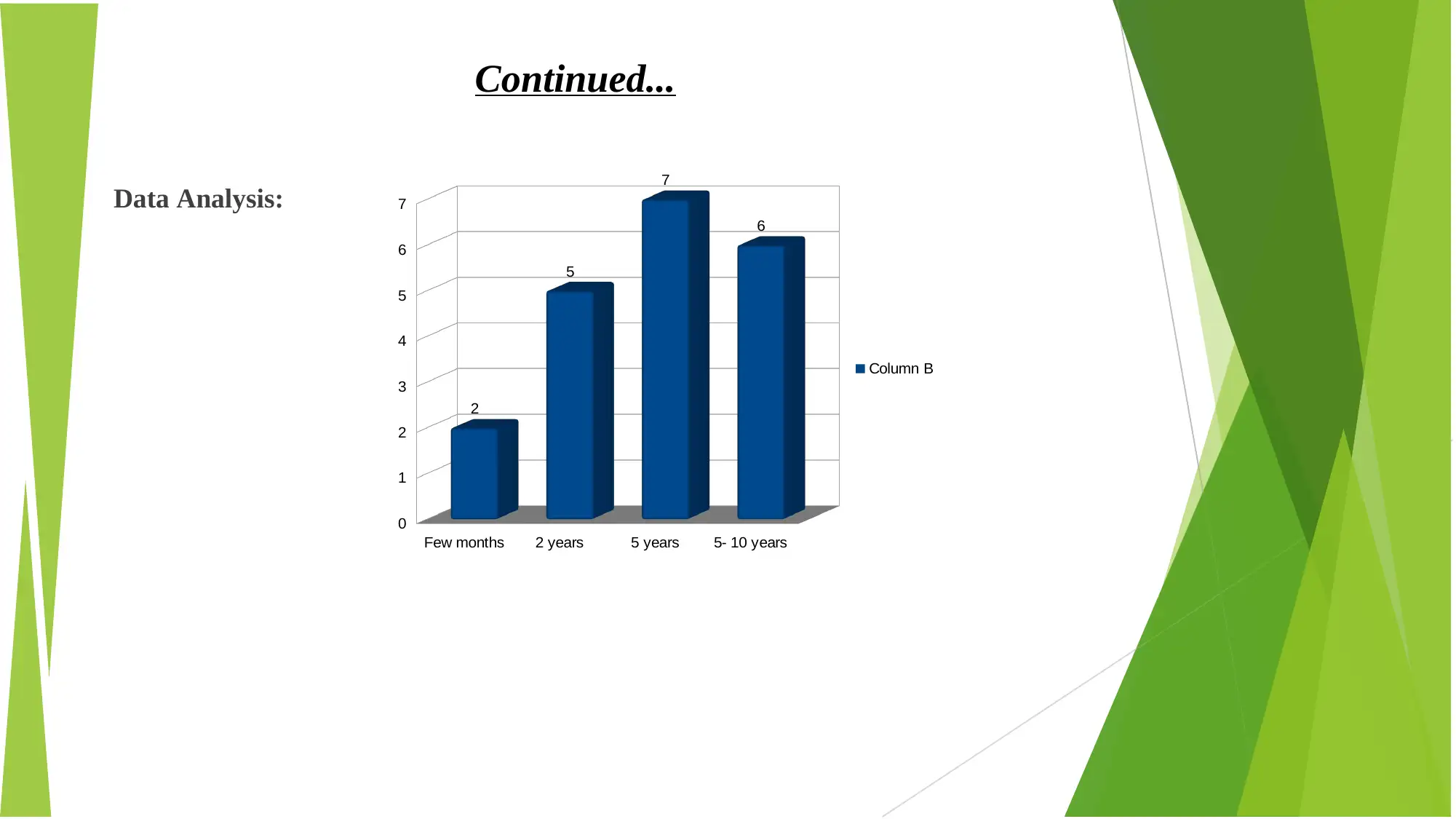
Continued...
Data Analysis:
Few months 2 years 5 years 5- 10 years
0
1
2
3
4
5
6
7
2
5
7
6
Column B
Data Analysis:
Few months 2 years 5 years 5- 10 years
0
1
2
3
4
5
6
7
2
5
7
6
Column B

Continued...
4
5
11
Financial Incentives.
Non- financial incentives
Both
4
5
11
Financial Incentives.
Non- financial incentives
Both
⊘ This is a preview!⊘
Do you want full access?
Subscribe today to unlock all pages.

Trusted by 1+ million students worldwide
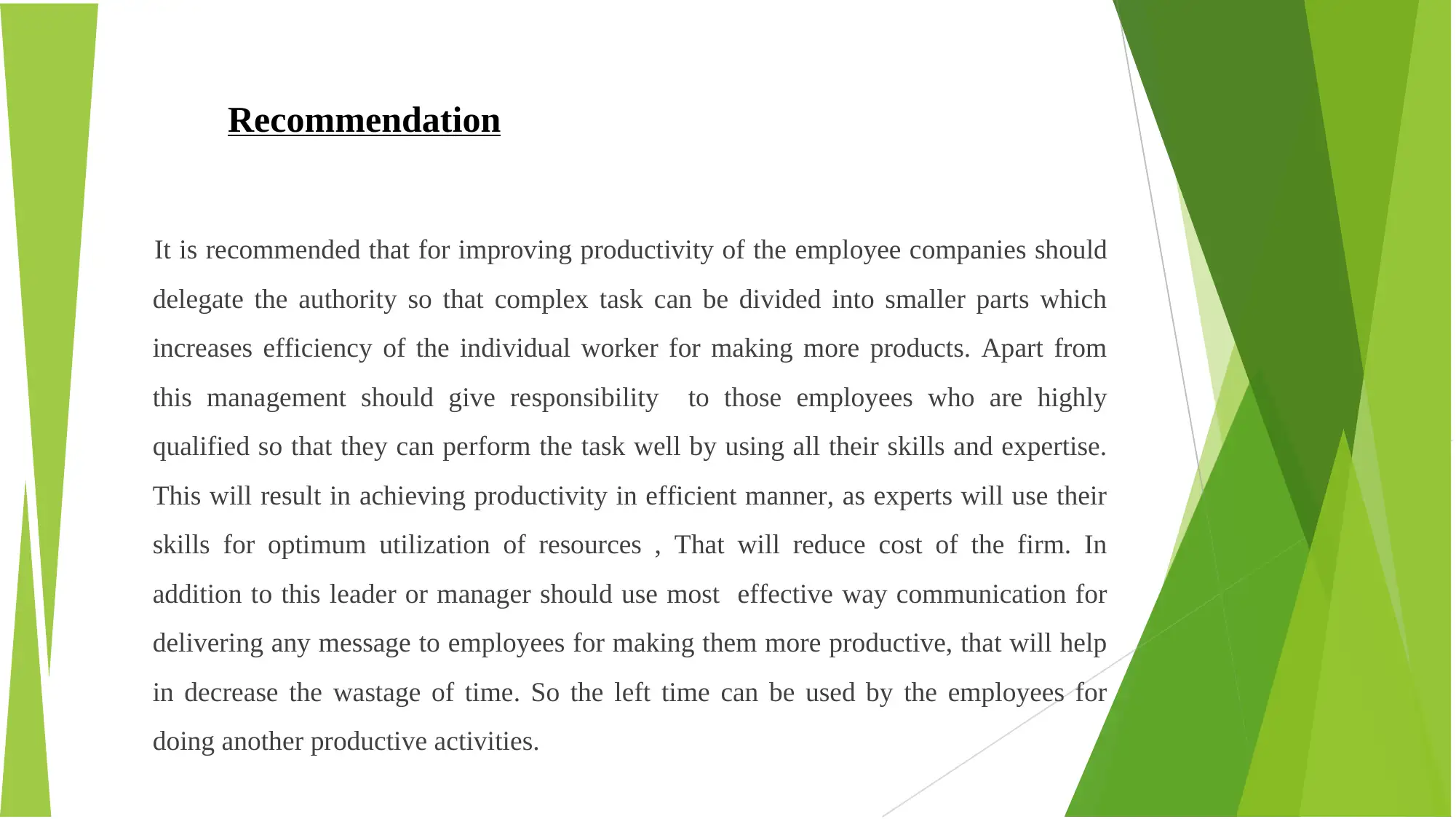
Recommendation
It is recommended that for improving productivity of the employee companies should
delegate the authority so that complex task can be divided into smaller parts which
increases efficiency of the individual worker for making more products. Apart from
this management should give responsibility to those employees who are highly
qualified so that they can perform the task well by using all their skills and expertise.
This will result in achieving productivity in efficient manner, as experts will use their
skills for optimum utilization of resources , That will reduce cost of the firm. In
addition to this leader or manager should use most effective way communication for
delivering any message to employees for making them more productive, that will help
in decrease the wastage of time. So the left time can be used by the employees for
doing another productive activities.
It is recommended that for improving productivity of the employee companies should
delegate the authority so that complex task can be divided into smaller parts which
increases efficiency of the individual worker for making more products. Apart from
this management should give responsibility to those employees who are highly
qualified so that they can perform the task well by using all their skills and expertise.
This will result in achieving productivity in efficient manner, as experts will use their
skills for optimum utilization of resources , That will reduce cost of the firm. In
addition to this leader or manager should use most effective way communication for
delivering any message to employees for making them more productive, that will help
in decrease the wastage of time. So the left time can be used by the employees for
doing another productive activities.
Paraphrase This Document
Need a fresh take? Get an instant paraphrase of this document with our AI Paraphraser
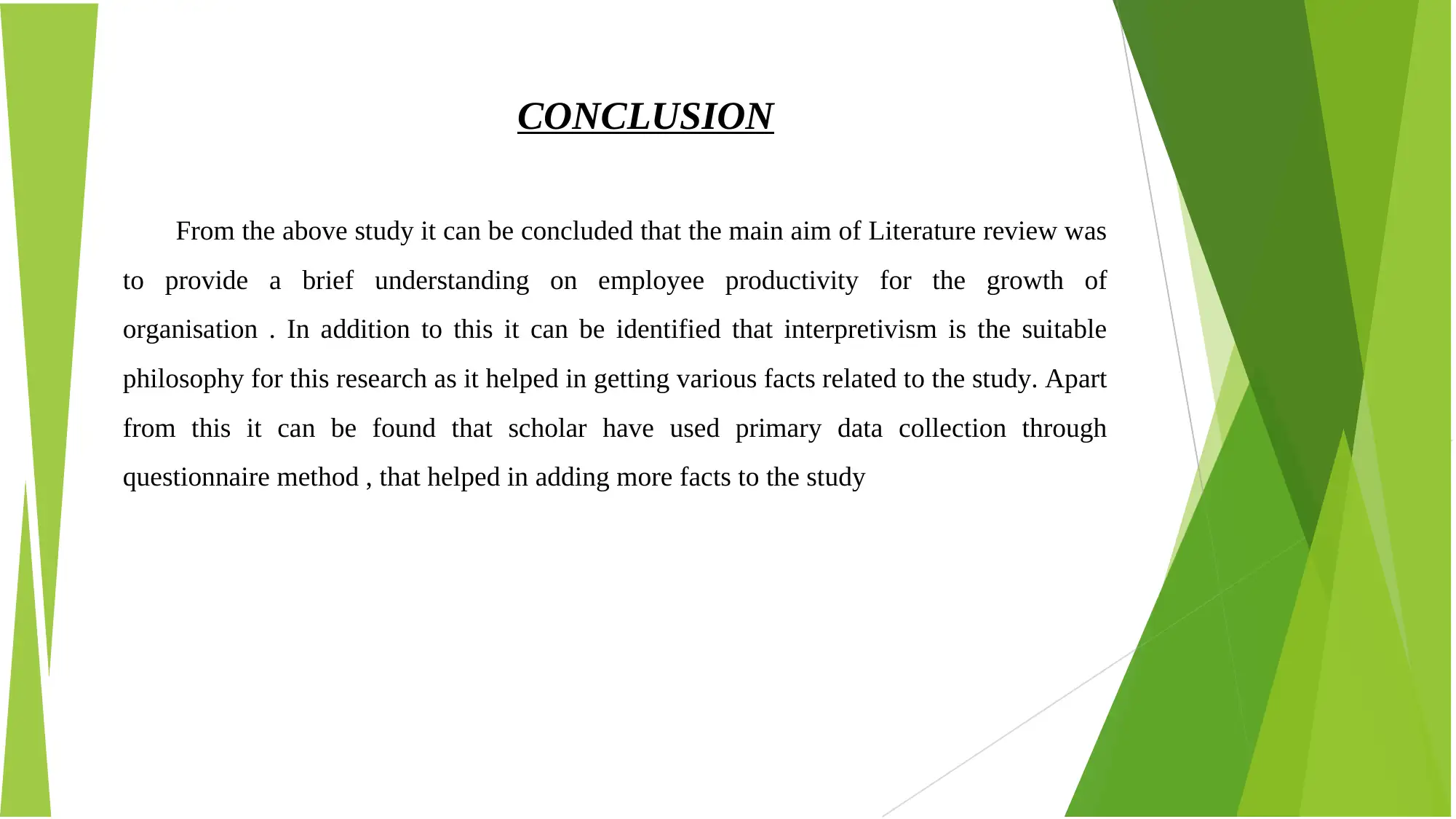
CONCLUSION
From the above study it can be concluded that the main aim of Literature review was
to provide a brief understanding on employee productivity for the growth of
organisation . In addition to this it can be identified that interpretivism is the suitable
philosophy for this research as it helped in getting various facts related to the study. Apart
from this it can be found that scholar have used primary data collection through
questionnaire method , that helped in adding more facts to the study
From the above study it can be concluded that the main aim of Literature review was
to provide a brief understanding on employee productivity for the growth of
organisation . In addition to this it can be identified that interpretivism is the suitable
philosophy for this research as it helped in getting various facts related to the study. Apart
from this it can be found that scholar have used primary data collection through
questionnaire method , that helped in adding more facts to the study

REFERENCES
Ahmad, F. and et.al., 2014. Impact of transformational leadership on employee motivation in
telecommunication sector. Journal of management policies and practices. 2(2). pp.11-25.
Bell, E., Bryman, A. and Harley, B., 2018. Business research methods. Oxford university press.
Bresler, L. and Stake, R. E., 2017. Qualitative research methodology in music education. In Critical
Essays in Music Education (pp. 113-128). Routledge.
Buchanan, D. A. and McCalman, J., 2018. High performance work systems: The digital
experience. Routledge.
Choy, L. T., 2014. The strengths and weaknesses of research methodology: Comparison and
complimentary between qualitative and quantitative approaches. IOSR Journal of Humanities
and Social Science. 19(4). pp.99-104.
Cording, M. and et.al., 2014. Walking the talk: A multistakeholder exploration of organizational
authenticity, employee productivity, and post-merger performance. Academy of Management
Perspectives. 28(1). pp.38-56.
Ahmad, F. and et.al., 2014. Impact of transformational leadership on employee motivation in
telecommunication sector. Journal of management policies and practices. 2(2). pp.11-25.
Bell, E., Bryman, A. and Harley, B., 2018. Business research methods. Oxford university press.
Bresler, L. and Stake, R. E., 2017. Qualitative research methodology in music education. In Critical
Essays in Music Education (pp. 113-128). Routledge.
Buchanan, D. A. and McCalman, J., 2018. High performance work systems: The digital
experience. Routledge.
Choy, L. T., 2014. The strengths and weaknesses of research methodology: Comparison and
complimentary between qualitative and quantitative approaches. IOSR Journal of Humanities
and Social Science. 19(4). pp.99-104.
Cording, M. and et.al., 2014. Walking the talk: A multistakeholder exploration of organizational
authenticity, employee productivity, and post-merger performance. Academy of Management
Perspectives. 28(1). pp.38-56.
⊘ This is a preview!⊘
Do you want full access?
Subscribe today to unlock all pages.

Trusted by 1+ million students worldwide
1 out of 13
Related Documents
Your All-in-One AI-Powered Toolkit for Academic Success.
+13062052269
info@desklib.com
Available 24*7 on WhatsApp / Email
![[object Object]](/_next/static/media/star-bottom.7253800d.svg)
Unlock your academic potential
Copyright © 2020–2026 A2Z Services. All Rights Reserved. Developed and managed by ZUCOL.





